Whether you play an electric, acoustic, or classical guitar, it’s important for a guitar player to have an understanding of guitar strings. Just putting a different set of strings will totally alter the sound and the feel of your playing. Strings are the connection from your fingers to the instrument. Oftentimes, guitar players overlook their strings and just buy whatever strings that they can find. But strings have a huge impact on the guitar and hopefully, this will be your chance to learn about guitar strings.
To really understand the different types of guitar strings, we need to first look at the basic parts that make up a guitar string. The two main parts of the guitar string can be divided up into core and winding.
String Core Considerations
Core is literally the core of a guitar string, and it’s the most important part.
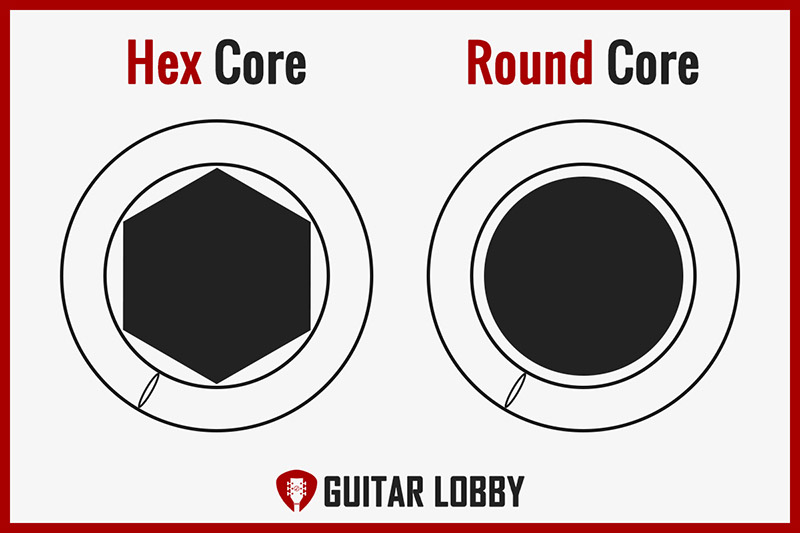
You will usually see hexagonal shapes on the modern guitar strings, and these hexagonal shapes provide a trustworthy & solid base while also being cost-effective. But in some rare cases, you can still find the traditional round core guitar strings. The traditional round core guitar strings are preferred by some jazz guitarists, and they tend to cost quite a bit more than the hexagonal core guitar strings.
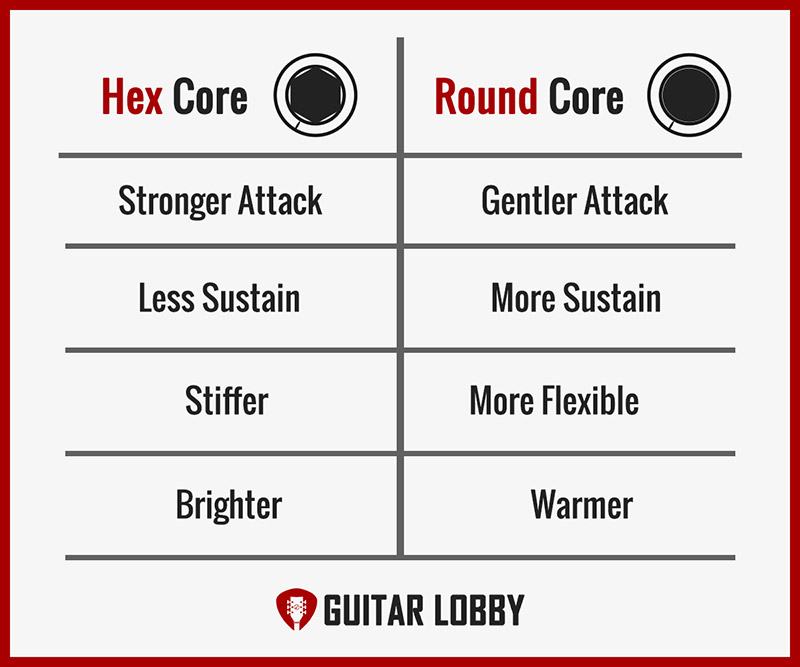
String Winding Methods
Winding represents the thin wire wrapped around the core of the guitar strings. They are essential because the winding is the main contact point from your fingers to your strings. Winding is divided up into roundwound and flatwound.
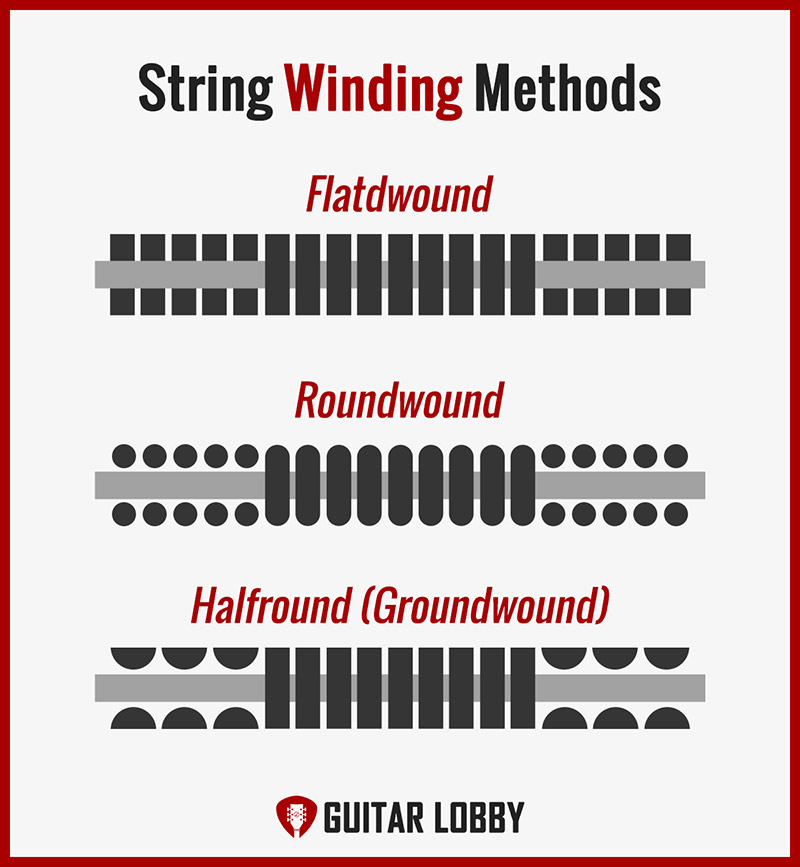
Roundwounds are the most common type of winding, and roundwounds are known for their bright and clear tones. They are the most popular type of winding, and they are perfect for all kinds of genres from Pop, Rock, Blues, RnB, to Jazz. The other type of winding is the flatwounds. Flatwounds offer a more mellow and softer sound, and it’s specifically suited for jazz guitarists that are into the traditional clean jazz tones.
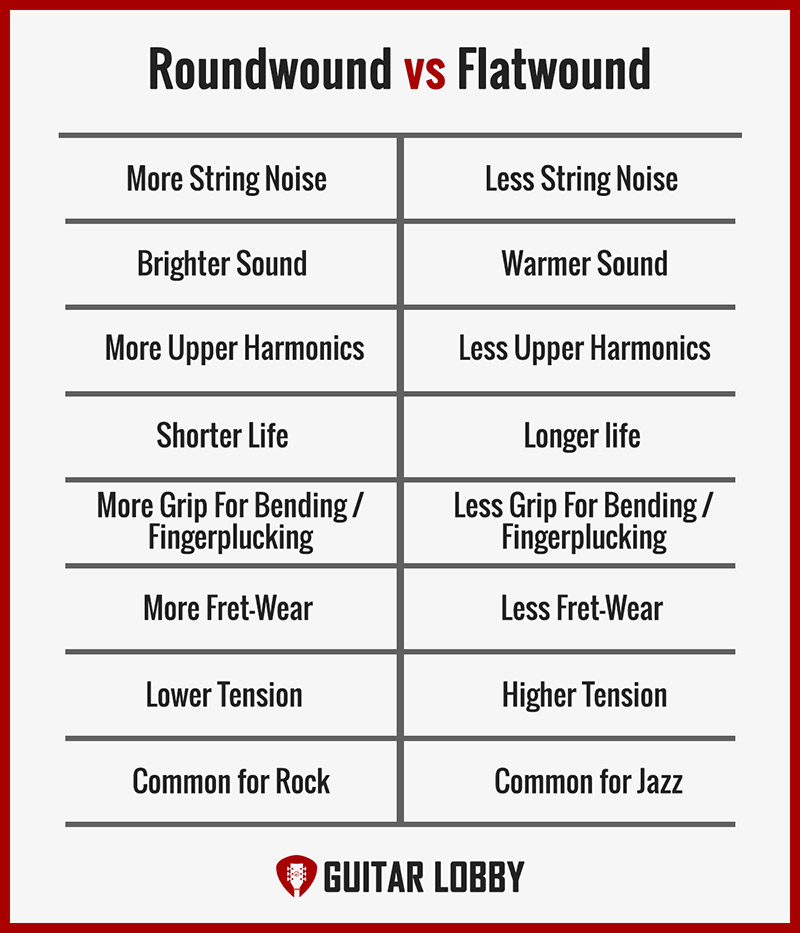
Coatings are the final part of guitar strings, and they are the extra layer of protection to prolong the lifespan of a guitar string. The coating guards the strings against factors like finger oils, salty air, humidity, and various weather conditions that guitarists have to face. Some excellent guitar strings by companies like Elixir or D’addario will be equipped with well-designed coatings that will prolong the lifespan by a big margin.
Lastly, there’s also another factor that is important to consider when dealing with guitar strings – gauge. String gauge basically refers to the diameter of the string, and it’s basically how we distinguish various different sizes in strings. Naturally, the difference in string gauge will impact the sound and the feel tremendously. Generally, thicker strings will produce warmer, thicker sounds while also creating more tension on the guitar. It will also be more difficult to press on the strings due to the higher tensions. There are also stylistic factors you need to consider regarding string gauges. For example, if you’re a shredding rock guitarist that needs to do wild guitar bends and play super hardcore, then you would most likely need thinner strings – somewhere in the 0.09 – 0.10 range. If you’re a blues guitarist trying to sound like SRV or BB King, you might be looking somewhere in the 0.11 – 0.13 range. So knowing your own preferred string gauge is an important part of being a good guitar player.
Understanding String Gauges
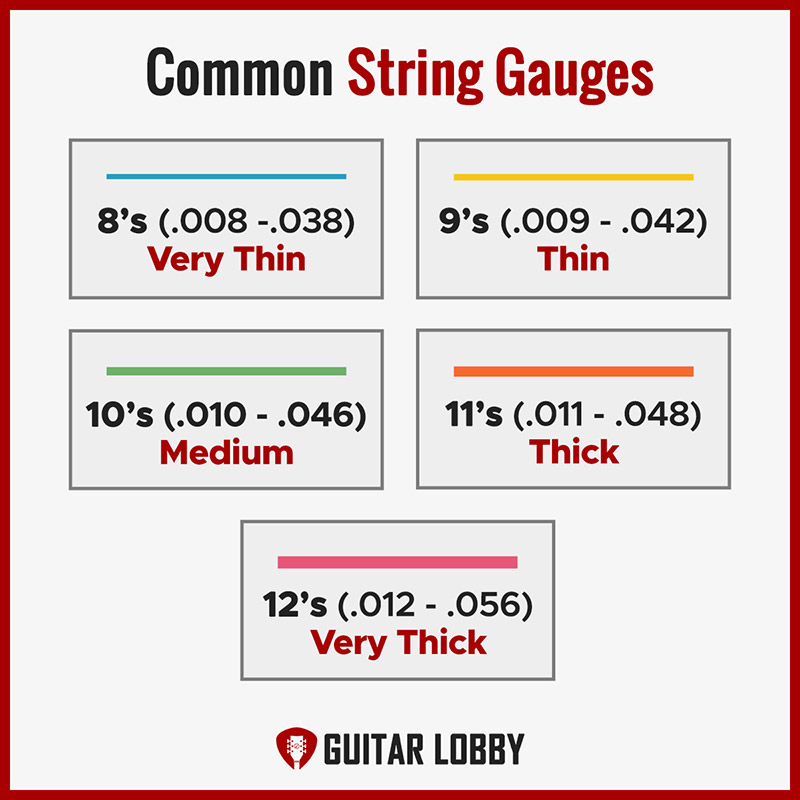
Acoustic Guitar String Gauges
Oftentimes, you’ll find that the acoustic guitar string sets are labeled a name for their string gauge. There are five main categories for acoustic guitar string gauges – Extra Light, Custom Light, Light, Medium, and Heavy. Acoustic strings tend to be a thicker gauge than electric guitar strings, so a string gauge that would be considered Extra Light for an acoustic guitar would be 0.010, 0.014, 0.023, 0.030, 0.039, and 0.047 – also known as 10’s. Custom Light would be more like 0.011, 0.015, 0.023, 0.032, 0.042, and 0.052 – also called 11’s. Light gauge will typically refer to 0.012, 0.016, 0.025, 0.032, 0.042, and 0.054 – also called 12’s. For Medium gauge you can expect something like 0.013, 0.017, 0.026, 0.035, 0.045 and 0.056 – 13’s. Heavyset would be 0.014, 0.018, 0.027, 0.039, 0.049, and 0.059 – 14’s. Oftentimes, beginners will be better suited to use lighter string gauges like 11’s or even 10’s for complete beginners. The heavier gauges might create more sound but it will be much more difficult to press onto, especially for beginners. So if you’re a beginner or intermediate player, you should consider getting yourself a Light or a Custom Light set of guitar strings.
Another important factor when looking at different types of acoustic guitar strings is knowing the body style of the guitar. Acoustic guitars can be divided into dreadnoughts, grand auditorium, and parlor guitars. Dreadnoughts have the biggest body of them all, and it also produces the most volume out of the different body types. Therefore, normally acoustic guitarists will use heavier gauge strings on dreadnought guitars. You can use up to 13’s on dreadnought guitars and the big body and the strong guitar neck will be able to handle the pressure well. Grand Auditorium-style guitars can also be great with 12’s and 13’s and you’ll get a much more mellow sound even with the same set of strings for dreadnought guitars. Lastly, Parlor guitars are much smaller in body size compared to dreadnoughts or grand auditorium guitars, and so they require strings that put less pressure on the guitar body. So string sets that are lower than 12’s work well with parlor guitars.
Some of the most notable brands for acoustic guitar strings are Martin, Elixir, D’Addario, Fender, and Ernie Ball. Elixir is known for creating long-lasting strings, while Martin, Fender, and D’Addario serve as the gold standard of acoustic guitar strings. On the other hand, Ernie Ball is known for creating a very affordable but solid and reliable set of guitar strings. Now let’s take a look at some of the most popular and recommended acoustic guitar strings that are on the market today.
Electric Guitar String Gauges
Just like acoustic guitar strings, electric guitar strings have many options for string gauges. Each gauge has its specific use that can be selected for different styles of music or playing style or even player’s level. Now let’s look at the 5 different string gauges for electric guitar.
8’s (0.008 – 0.038) Very Thin
These are the thinnest string gauge for electric guitar, and because the strings themselves are so thin, you can expect the tone to come out very bright and thin as well. The set will consist of 6 strings – 0.008, 0.010, 0.015, 0.021, 0.030, 0.038. 8’s will be suitable for complete beginners who want very little string tension or rock and metal guitar players looking to shred as much as possible. But for most guitar players, 8’s might be too thin for you.
9’s (0.009 – 0.042) Thin
The 9’s consist of 0.009, 0.011, 0.016, 0.024, 0.032, and 0.042. The 9’s are the second most popular string gauge for electric guitarists and the reason for that is because the string tension is easy to play on and the tone from 9’s are versatile through many different genres. Typically many rock, country, or pop guitarists will use this string gauge and you can get a twangy, bright, and harmonics-filled tone with this string gauge. The decreased string gauge also makes this set suitable for beginners who still haven’t developed much finger strength for bending or vibratos.
10’s (0.010 – 0.046) Medium
The 10’s are the most popular type of string gauge by far. It consists of 0.010, 0.013, 0.017, 0.026, 0.036, and 0.046. These are the most popular string gauge for a reason – it has so many advantages that make it perfect for so many genres and playing styles. They are right at the middle of string thickness, so the tone is balanced and not too thin for genres like jazz, blues, or RnB. The string tension is also not too much and not too little, and it’s good enough to bend wildly without having super strong fingers. They can also provide a solid base for a rhythm guitar tone as well as lead guitar tone.
11’s (0.011 – 0.048) Thick
Now we are entering into the thicker guitar string category. The 11’s consist of 0.011, 0.015, 0.022, 0.030, 0.042, and 0.054. Because the strings are on the thicker side, the tone also becomes warmer and thicker than the other string gauges. These strings are great for blues and jazz tone, or metal players who want to tune down to low C. But the downside might be that because it creates more string tension, there is more pressure on the guitar neck and it will be harder for players to press onto the strings. The 11’s are recommended to more experienced guitar players who know what kind of sound they want and have already developed enough finger strength to play into thicker strings.
12’s (0.012 – 0.056) Very Thick
Finally, we have the 12’s and they consist of 0.012, 0.016, 0.024, 0.032, 0.044, and 0.56. There are actually thicker strings like 13’s on the market, but for the most part, 12’s will be the thickest string gauge available on most retail store racks. With these, you can expect a really full, creamy, and warm tone. Now obviously, these are pretty hard to play with. Unless you have super left-hand finger strength like Stevie Ray Vaughan or BB King, it won’t be easy to bend or do wild vibratos with these guys. Of course, there are experienced guitarists who want that thick sound, but in most cases, these are not recommended for beginner or intermediate guitar players. These are popular with jazz guitarists that specialize in bebop or traditional jazz as well.
Here Are the Different Types of Guitar Strings
1. Acoustic Guitar Strings
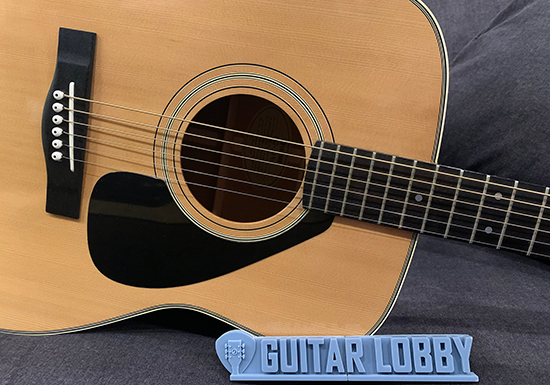
For acoustic guitar strings, you will most likely be using steel guitar strings. They help produce the iconic bright and responsive sound that we all are used to. The two main types of steel guitar strings that you can find are 80/20 bronze and phosphor bronze strings.
80/20 bronze acoustic guitar strings were developed by John D’Addario and John D’angelico in 1930, and the name refers to strings composition – 80% copper and 20% zinc. They are the most common type of acoustic guitar strings, and they are known for their bright sparkling tone. But the downside to this type of string is that these tend to oxidize quickly and the lifespan is not as long as phosphor bronze. These sparkling bright strings are a perfect match for your dreadnought and large body acoustics.
Phosphor bronze strings are another popular type of strings for acoustic guitar, and they are known for their long lifespan. These strings consist of copper with 8-10% tin and a little bit of phosphorus. Compared to the 80/20 bronze strings, these strings tend to produce a more warm and mellow sound.
There are also other types of acoustic strings like Nickel Bronze, Brass, Silk and Steel, and Aluminum Bronze. Nickel Bronze are strings that provide very natural-sounding guitar tones and D’addario was the first company to put out nickel bronze strings onto the market. These strings stay in-tune for a long time, and they tend to really bring out the tone of the guitar. Brass strings are not as common, and they produce a very bright jangly tone. Silk and Steel are strings that produce a soft and quiet mellow tone that is perfect for folk music. These strings also tend to be much easier on your fingers than other types of strings. Aluminum Bronze is also pretty rare to find in the market, and they produce a very unique crispy guitar tone.
Popular Acoustic Guitar Strings
These are some acoustic guitar strings we recommend. For a full list check out our page on our favorite acoustic guitar strings here.
Elixir 80/20 Bronze with Nanoweb
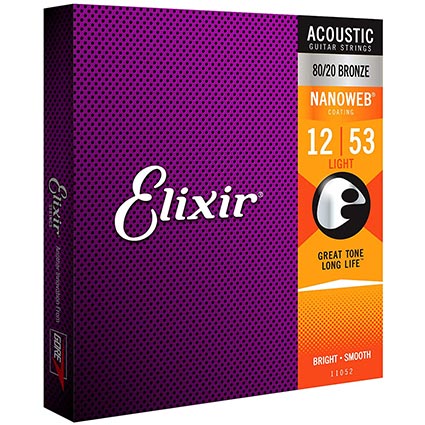
Elixir 80/20 Bronze with Nanoweb is one of the most popular products in the market today. They are known for their groundbreaking Nanoweb technology, which provides extra long lifespan and its coating provides some of the best protection around. It comes in various string gauges and the tone quality is sparkling clean and gives a highly playable tone. Many times you’ll find that coating might negatively affect the guitar tone in some way, but that’s not the case with these strings.
Ernie Ball Earthwood Phosphor Bronze
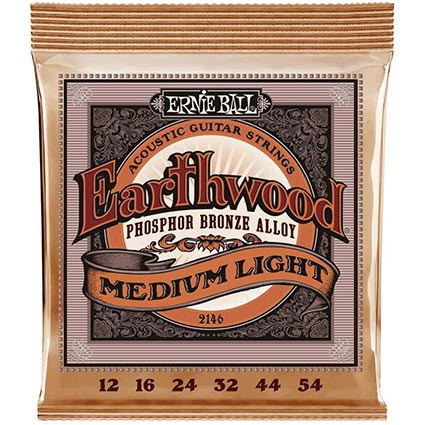
Different from the sparkling and bright sound of 80/20 Bronze strings, these Ernie Ball Earthwood Phosphor Bronze offers a super warm and clear sound with balanced tone. Because of its excellent tone, many legendary guitarists like John Mayer, Paul McCartney, and Brad Paisley all adore using the Earthwoods set. These are great for solo acoustic guitar playing as well as accompanying vocals.
D’addario Nickel Bronze Acoustic Guitar Strings
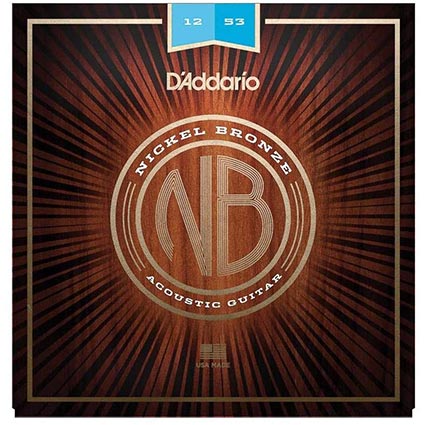
The Nickel Bronze strings by D’addario is another extremely popular product in the market, and it’s known for its uncoated guitar strings that provide crispy and natural sound. The disadvantage of uncoated guitar strings might be that the lifespan won’t be as long. But this is a very reliable set of strings that are perfect for acoustic-electric guitars because it provides a lot of midrange for a full band playing.
Martin Authentic Acoustic Superior Performance
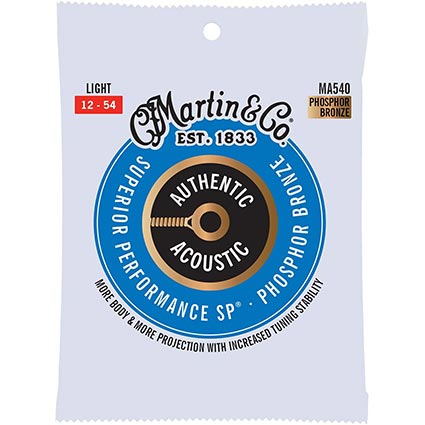
The Martin Authentic Acoustic string series are a classic set of strings that have been around for a long time now, and you’ll find many different versions including Tommy Emmanuel’s custom gauges. The Superior Performance set is a gold standard of them all, and it comes in either 80/20 bronze or phosphor bronze versions. They last long, sound great and are made from the most famous acoustic guitar brand. What more can you ask?
2. Electric Guitar Strings
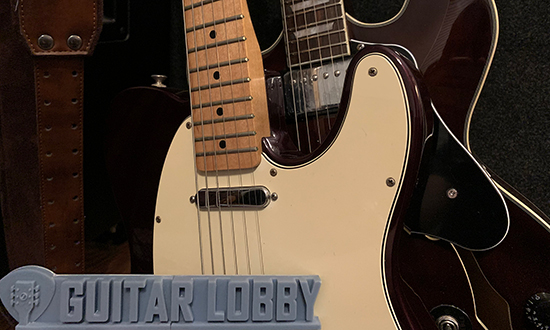
Electric guitar strings share many similarities with acoustic guitar strings. The strings have a steel core wrapped in alloy wrap wire, and the most popular type of alloy is nickel plated steel. Nickel plated strings are going to be what most electric guitar players will use, but there are some other types of electric guitar strings as well. Pure nickel strings are made with 100% nickel wrap wire and the tone is much warmer and creamier than nickel plated strings. These are pretty rare to find in the market, but companies like Gibson do produce pure nickel strings. Stainless steel strings are also another type of alloy you can find these days. Stainless steel strings have a much more bright and crispy tone compared to pure nickel or nickel plated strings. They also last longer than most other strings, so it’s perfect for guitar players with sweaty hands. Some other rare types of alloy you can find include but are not limited to cobalt, zinc-plated steel, and Superalloy. These are not commonly used by musicians. But they each have their own unique characteristics, and if you’re someone who likes to experiment with guitar tones, then it might be good to out different types of electric guitar strings.
Popular Electric Guitar Strings
These are some electric guitar strings we recommend.
D’addario NYXL Nickel Wound Strings
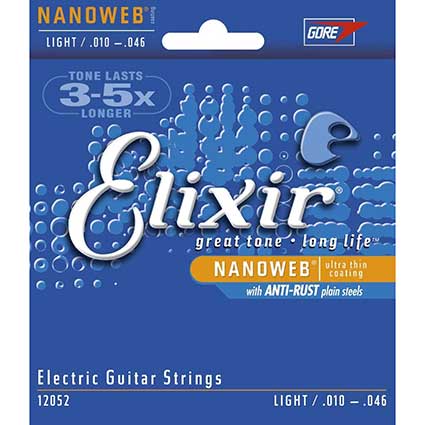
As we all know, D’addario is probably the most well-known and trusted company for guitar strings of all kinds. They continue to innovate and improve their strings, and this product is no exception. The NYXL Nickel Wound strings are designed to bend further and project more sound than strings from other brands. These newly engineered strings are made of high-carbon steel core and plain steel alloy. They are extremely hard to break and stay in tune for a surprisingly long period of time. This product comes in various string gauges and it will suit all kinds of musical styles. The D’addario NYXL Nickel Wound won’t disappoint and it’s highly recommended by many professional guitarists.
Ernie Ball Regular Slinky Nickel Wound
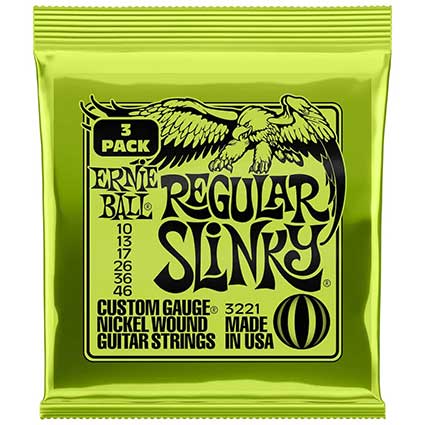
To start off the list, here is an affordable set of strings that are beloved by both guitarists and hobbyists alike. Ernie Ball has been producing electric guitar strings since the 1960s, and they are famous for creating reliable strings. The Ernie Ball Regular Slinky is one of their popular products, and especially the set of 10’s is the most popular string gauge. These strings are made of nickel plated steel wrapped around a carbon steel core. The strings have rich harmonics and a very balanced tone, and it’s a very versatile set of strings meant for various styles of music. Also, the lock twist feature allows for users to change strings very quickly. But the biggest advantage of Ernie Ball strings might be that they are very affordable, and you can often buy multiple sets in one package. In any case, Ernie Ball Regular Slinky Nickel Wound strings are recommended for both experienced and beginner guitarists.
Elixir Nanoweb Electric Guitar Strings

Here is another amazing set of strings by the one and only Elixir. This product comes at a slightly higher price than some of the other popular strings, but it’s all worth it at the end. The Nanoweb technology came after a long process of research, and this technology allows for strings to last an extremely long time. The Nanoweb technology shields the string’s core from factors like air, humidity, dirt, and sweat. These will last a couple more months than many of the other options out there. The tone from these strings is bright, has a lot of punch, and is very responsive to your playing. If you like premium products that last longer, the Elixir Nanoweb electric guitar strings will be perfect for you.
Fender Original Bullet Electric Guitar Strings
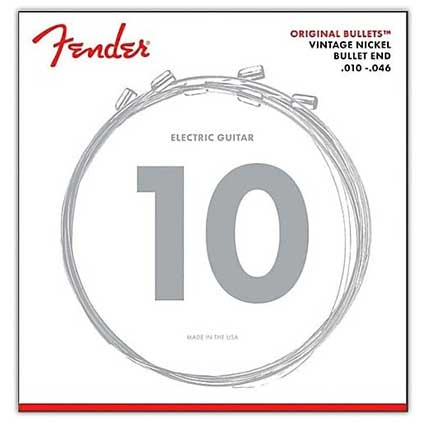
The famous guitar brand Fender also makes high quality guitar strings and the Original Bullet strings are one of their best-selling products. The name comes from bullet-shaped string end, which is designed to give the best string to body contact and increase resonance of the guitar. The technology also increases the sustain and allows you to get the full sound that will suit genres like jazz and blues. These strings will be a perfect pairing for Fender Strats and Teles, and you might be able to get that special vintage tone you were looking for.
D’addario Balanced Tension XL Strings
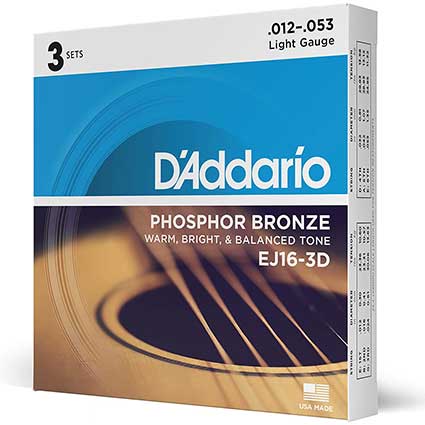
Here is another best-selling set of electric guitar strings by D’addario. D’addario makes their strings using ultra-precise technology, and these strings are equalized and measured to the smallest detail. These are great for guitar players looking for a versatile set of strings that are affordable. You can get great strumming, picking, bending, and finger-plucking tones from these strings.
3. Classical Guitar Strings
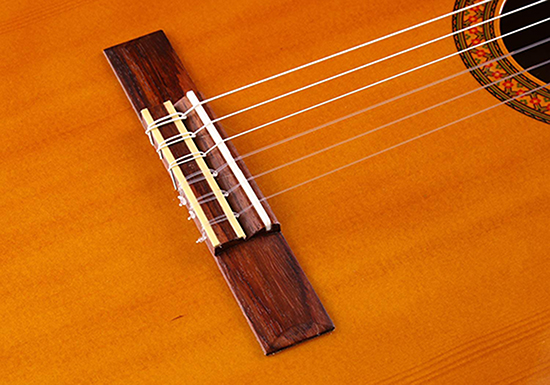
Classical guitars are the guitars that have been around the longest, and the early guitars way before the 19th century are known to be played with natural “gut” strings or even strings made out of catgut. The string manufacturers had to find a way to produce guitar strings with natural materials, and that was how they made the early classical guitar strings. You can still find them today through various online shops, but they are not recommended because modern nylon classical guitar strings are much well-made and have a longer lifespan.
After World War II, a man named Albert Augustine invented the nylon guitar strings by accident. The nylon guitar strings ended up being much easier to produce in big amounts and they turned out to be much more durable than strings made out of the animal gut. These are also called synthetic nylon guitar strings, and they have a very distinctive tone that is hard to confuse with any other type of guitar string. You’ll find nylon guitar strings on all the classical guitars and ukuleles today. Various notable nylon guitar string brands will use different nylon fibers. For example, strings on a D’addario nylon string set will feel completely different from strings on a Savarez nylon string set.
Usually, the 1st string up to the 3rd string will be clear plain nylon strings while the 4th string to the 6th string will be silver-wrapped bass strings. This also goes for acoustic guitar and electric guitar strings. There are also black nylon strings, and these are used amongst flamenco and folk guitarists. The black nylon strings produce brighter sounds than regular classical nylon strings. Another uncommon type of classical guitar string is the fluorocarbon strings, which have a closer sound to the gut strings and have a brighter and harder sound. They might also produce more sound than nylon strings, but the downside might be that it’s harder to perform vibratos and bends on fluorocarbon strings.
Popular Classical Guitar Strings
Here are some classical guitar strings we recommend. For a full list check out our article on our favorite classical guitar strings here.
Savarez 540R Alliance
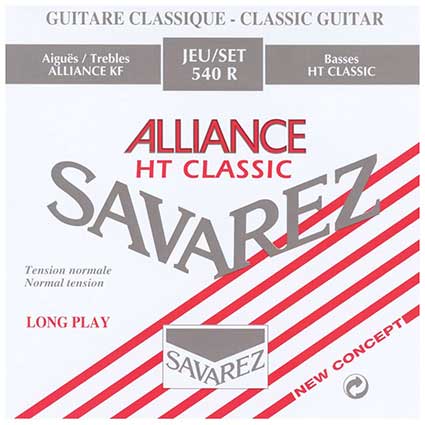
The Savarez 540R Alliance is a popular product that has been around for a while, and this company has been making classical guitar strings since 1770. So you can say that they know what they are doing. This set features carbon composite nylon treble strings combined with silver-plated copper wound strings for the 3 bass strings. These strings resonate beautifully and the sound is close to the traditional gut strings. Guitar students, classical guitarists, and flamenco guitarists all praise this set of strings for its longevity, projection, response, and tone. This product goes under the medium to normal tension category.
D’addario Pro Arte EJ49 Black
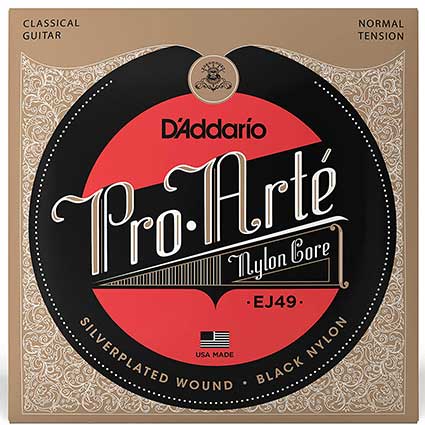
This is hands down one of the most popular sets of classical guitar strings, and the quality of it explains why it’s so popular. The D’addario Pro Arte EJ49 Black is very versatile, balanced, comfortable, and responds extremely well to the touch of your fingers. As mentioned in the name, the treble strings are laser sorted black nylon strings and the bass strings are silver-plated wound strings. This also goes under the medium/normal tension category and the tension is very comfortable for both your left and right hand.
Hannabach 815 LT
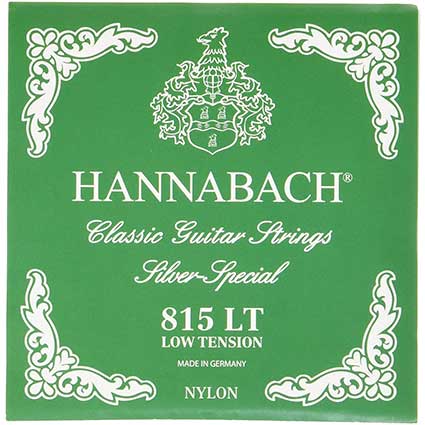
Hannabach is another very popular company known for producing high-quality classical guitar strings. The Hannabach 815 LT is one of their best-sellers, and the LT stands for Low Tension, meaning it’s much more comfortable to play. These have regular nylon treble strings with silver-plated bass strings. For a low tension set of strings, the Hannabach 815 LT produces a quite large sound and the sound is balanced throughout. Overall, this set of strings will produce a beautiful, mellow tone.
D’addario EJ46 Pro Arte
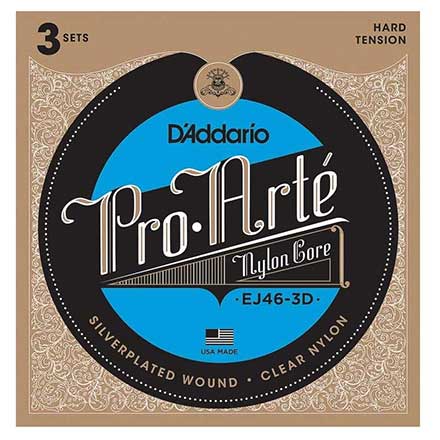
This is another popular set of strings from the D’addario Pro Arte series. The EJ46 is a hard tension version and all the nylon strings measured by laser for perfect consistency between each product. It has three clear nylon treble strings with three silver-plated bass strings. Because of the hard tension, this set of strings really packs a hard punch in the sound and it has a lot of sustain on the notes. The bass tones are also powerful and the middle strings really project each note extremely well. But the downside of hard tension strings might be that the lifespan is pretty short compared to other types of strings. Overall, the D’addario EJ46 Pro Arte is for those guitarists that need powerful and aggressive classical guitar strings.
4. Hybrid Strings
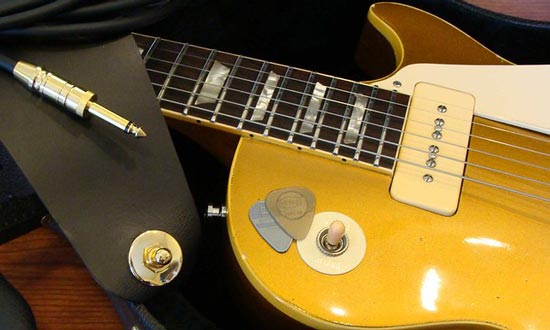
Hybrid strings mix and match different string gauges. For example, one hybrid set could have three top strings from 10’s and three bottom strings from 11’s. They are useful for drop tuning purposes or specific soloing purposes.
Roundwound vs Flatwound Electric Guitar Strings
Like I briefly mentioned in the introduction, in most cases, you will use roundwound guitar strings. Roundwound strings project more harmonics and have more punch in the sound. And plus, for most genres like pop, RnB, rock, metal, blues, or country, guitar players will use roundwound strings. Flatwound strings have an extra layer of polished ribbon winding around them, so it results in a more mellow, dull, and warm sound. You’ll find traditional jazz guitarists using these, or some fingerstyle guitarists and slide guitar players use flatwound strings. The feel of flatwounds are totally different from roundwound strings, and the downside of flatwounds is that you can’t really bend the string too much. Companies like D’addario, La Bella, or Thomastik Infeld produce flatwound strings that are specifically targeted for jazz guitar players.
5. 12 String Guitar Strings
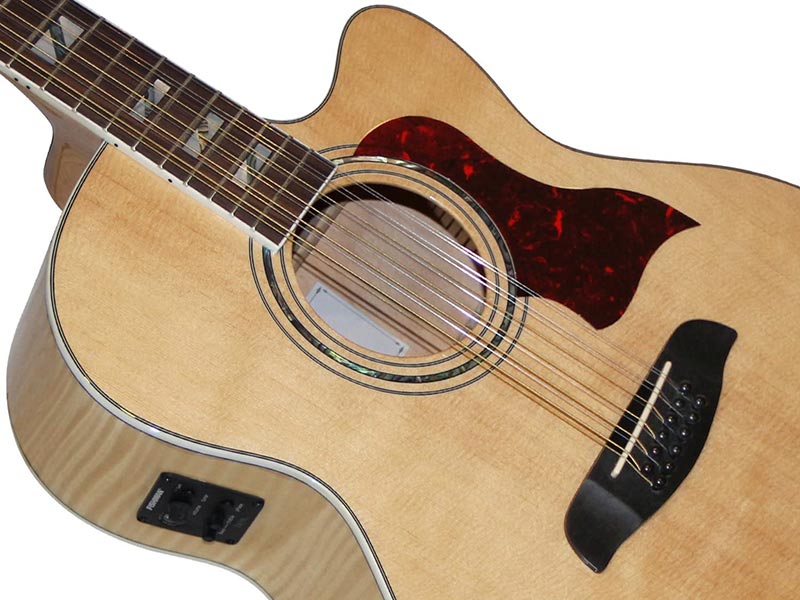
Although not as common as 6-string guitars, 12-string guitars are beautiful instruments that can produce full and warm sound. They are amazing for both fingerstyle playing and strumming chords. You can find both electric and acoustic guitars with 12 strings, and even though they look similar to a 6-string, the feel and the sound is totally different. And in terms of tuning, it’s the same EADGBE and each note is doubled either by the same note or an octave. From the 4th string to the 1st string, there is a thinner string right next to it that is an octave higher. For the top two strings, there are two identical strings that are tuned the same.
When it comes to string gauges for 12-string guitars, it’s the same deal as regular acoustic or electric guitars. The most popular string gauges are 10’s, and there are other string gauges options like 9’s, 11’s, or even 12’s. Now let’s take a look at some popular 12-string guitar strings.
Popular 12 String Guitar Strings
Elixir 16152 Nanoweb Coated Phosphor Bronze 12-String 10-47
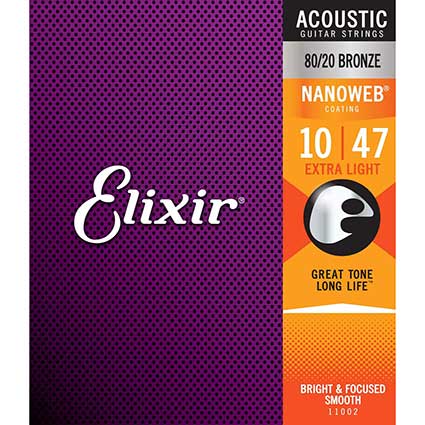
The above-mentioned Nanoweb technology is used for this set, and these strings will last longer than normal sets of strings. The Elixir Nanoweb Phosphor Bronze 12-String is designed for acoustic guitars and you can expect a super punchy, bright, and full-sounding tone with these strings on your guitar. The set consists of two 0.010, two 0.014, 0.023 & 0.009, 0.030 & 0.012, 0.039 & 0.018, 0.047 & 0.027.
D’Addario EXL150 Nickel Wound 12 String Electric Guitar Strings
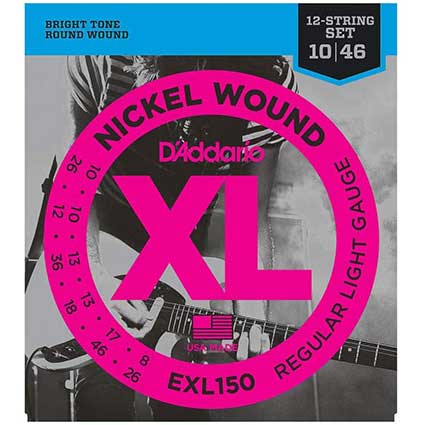
This is one of the most popular products for 12-strings, and this set is designed for electric guitar. D’Addario’s EXL series offers a very comfortable, distinct, and bright tone that stands out from the others. Another advantage is that this set comes at a very affordable price – at only $7. The set consists of two 0.010, two 0.013, 0.017 & 0.008, 0.026 & 0.012, 0.036 & 0.018, 0.046 & 0.026.
Conclusion
Strings are one of the most important aspects of a guitar, but also one of the most overlooked aspects when it comes to guitars. They are the direct connecting link between your fingers and the guitar, and just changing strings can have a huge impact on the sound of your guitar. So if you previously haven’t paid much attention to guitar strings, I highly recommend you to try out different string gauges, different brands, different string types. Then, you can decide which kind of strings or what string gauge matches your playing style. Trying out many different options is the best way to find your go-to strings. After reading this article, I really hope that you will find your favorite guitar string set!

My name is Chris and I’ve had a passion for music and guitars for as long as I can remember. I started this website with some of my friends who are musicians, music teachers, gear heads, and music enthusiasts so we could provide high-quality guitar and music-related content.
I’ve been playing guitar since I was 13 years old and am an avid collector. Amps, pedals, guitars, bass, drums, microphones, studio, and recording gear, I love it all.
I was born and raised in Western Pennsylvania. My background is in Electrical Engineering, earning a Bachelor’s degree from Youngstown State University. With my engineering experience, I’ve developed as a designer of guitar amplifiers and effects. A true passion of mine, I’ve designed, built, and repaired a wide range of guitar amps and electronics. Here at the Guitar Lobby, our aim is to share our passion for Music and gear with the rest of the music community.
